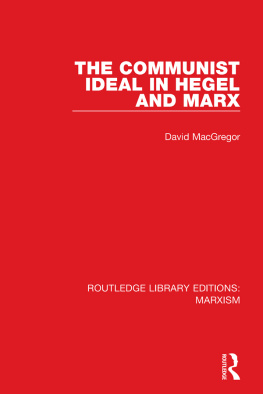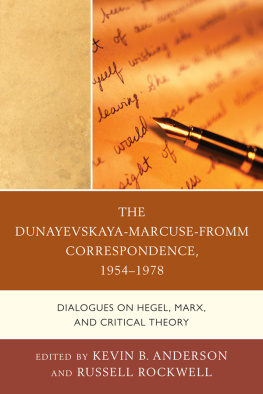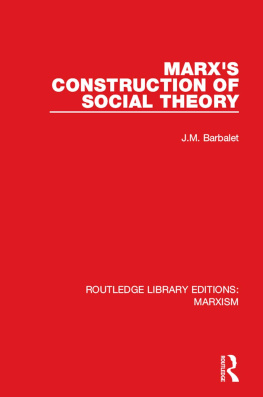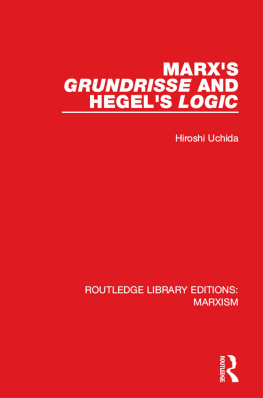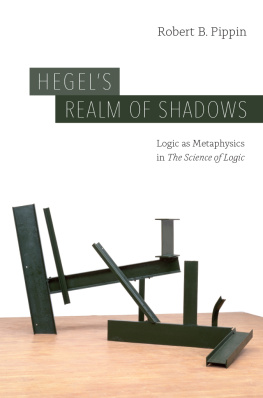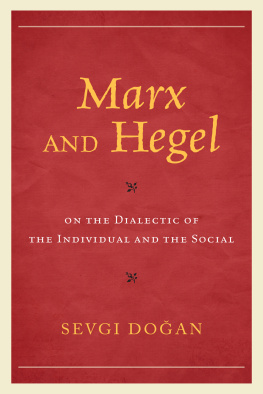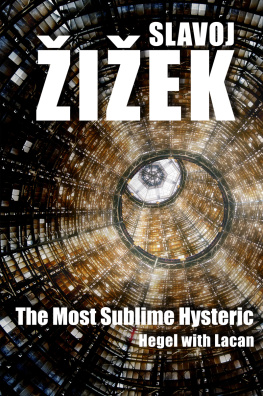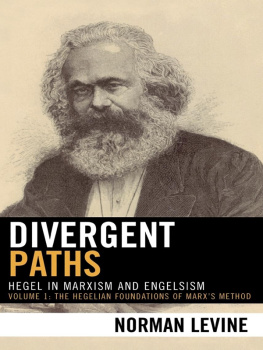ROUTLEDGE LIBRARY EDITIONS: MARXISM
Volume 2
THE COMMUNIST IDEAL IN HEGEL AND MARX
THE COMMUNIST IDEAL IN HEGEL AND MARX
DAVID MACGREGOR
First published 1984
This edition first published in 2015
by Routledge
2 Park Square, Milton Park, Abingdon, Oxon OX14 4RN
and by Routledge
711 Third Avenue, New York, NY 10017
Routledge is an imprint of the Taylor & Francis Group, an informa business
1984 David MacGregor
All rights reserved. No part of this book may be reprinted or reproduced or utilised in any form or by any electronic, mechanical, or other means, now known or hereafter invented, including photocopying and recording, or in any information storage or retrieval system, without permission in writing from the publishers.
Trademark notice: Product or corporate names may be trademarks or registered trademarks, and are used only for identification and explanation without intent to infringe.
British Library Cataloguing in Publication Data
A catalogue record for this book is available from the British Library
ISBN: 978-1-138-85502-1 (Set)
ISBN: 978-1-315-71284-0 (Set) (ebk)
ISBN: 978-1-138-89103-6 (Volume 2) (hbk)
ISBN: 978-1-315-70918-5 (Volume 2) (ebk)
Publishers Note
The publisher has gone to great lengths to ensure the quality of this reprint but points out that some imperfections in the original copies may be apparent.
Disclaimer
The publisher has made every effort to trace copyright holders and would welcome correspondence from those they have been unable to trace.
The Communist Ideal in Hegel and Marx
DAVID MACGREGOR
George Allen & Unwin
LONDON and SYDNEY
University of Toronto Press 1984
This book is copyright under the Berne Convention.
No reproduction without permission. All rights reserved.
George Allen & Unwin (Publishers) Ltd
40 Museum St, London WC1A 1LU, UK
George Allen & Unwin (Publishers) Ltd
Park Lane, Hemel Hempstead, Herts HP2 4TE, UK
George Allen & Unwin Australia Pty Ltd, 8
Napier Street, North Sydney, NSW 2060 Australia
Printed in Canada
ISBN 0 04 909016x
Contents
1
Hegel and Marx
2
Religion, Philosophy, and the Development of Individual Consciousness
3
From Theology to Absolute Idealism
4
Alienation and Ideology
5
Kant and the Bourgeois World of Abstraction
6
Capitalism, Class, and Profit
7
The External Capitalist State
8
Dialectic and the Rational State
Preface
Theoretical work is lonely by nature and thus the community and encouragement of friends and mentors is doubly important. I welcome the opportunity to thank Patricia Bishop without whose intelligent and perceptive criticism this book could not have been completed. I am also pleased to acknowledge the guidance and interest of Donald G. MacRae, Professor of Sociology at the London School of Economics, who supervised the PhD dissertation that forms the basis of this book. R.I.K. Davidson, my editor at the University of Toronto Press, offered his cheerful and generous support at all the arduous stages of the publication process and made my life considerably easier and happier than it otherwise would have been. C.B. Macpherson at the University of Toronto read an early version of the manuscript and helped it along to publication; and John Keane gave valuable comments and advice.
This is the place to express my appreciation for the insightful criticism and patient editing of the anonymous reader at the University of Toronto Press. In addition I would like to acknowledge the helpful comments of the reviewer at the Social Science Federation of Canada.
My friends Lesley De Pauw, Mark De Pauw, Stan Marshall, Gerry Nixon, and Sheila Zurbrigg gave me support and confidence in the long days of writing this book. My colleagues at Kings College, Bernie Hammond, Kathy Kopinak, and Alan Pomfret, read and commented on the manuscript; Al Koop, David Flynn, and Dante Lenardon extended important assistance. At the University of Western Ontario, Tom Sea provided helpful advice on the historical context of the writings of Hegel and Marx, and James Rinehart gave me lots of arguments on Marxism. Sean OHegarty read the various drafts of this study and offered useful suggestions. The debt I owe to my sister Betty is immense.
The Research Grants Committee at Kings College provided crucial financial assistance, and the Dean and the Principal of the College have been most supportive. My years at the LSE were amply funded by the Canada Council. This book has been published with the help of a grant from the Social Science Federation of Canada, using funds provided by the Social Sciences and Humanities Research Council of Canada.
I would like to thank David Boudreau and Cathy Mendier for their assistance in editing the manuscript. Jean Fyfe, Jean Murphy, Lynda Laird, Miff Lysaght, and Cathy Mendier have all at one time or another and with great forbearance and skill transformed my awkwardly typed pages into a legible product.
A special acknowledgment goes to my friend who sees in black and white; Patricia will know whom I mean.
D.M.
The Communist Ideal in Hegel and Marx
| He: | You are right. The main thing is that you and I should exist, and that we should be you and I. Apart from that let everything go as it likes. The best order of things, to my way of thinking, is the one I was meant to be part of, and to hell with the most perfect of worlds if I am not of it. I would rather exist, even as an impudent argufier, than not exist at all. |
| I: | There is nobody who doesnt share your opinion and criticize the existing order of things without realizing that he is thereby denying his own existence. |
Diderot, Rameaus Nephew
What is rational is actual and what is actual is rational. On this conviction the plain man like the philosopher takes his stand, and from it philosophy starts in its study of the universe of mind as well as the universe of nature. If reflection, feeling, or whatever form subjective consciousness may take, looks upon the present as something vacuous and looks beyond it with the eyes of superior wisdom, it finds itself in a vacuum, and because it is actual only in the present, it is itself mere vacuity.
G.W.F. Hegel, Philosophy of Right
Lenin was among the first to realize that a profound understanding of Marx demands a thorough knowledge of Hegel. Marx uses Hegelian categories throughout his work, and he assumes in his readers some familiarity with dialectical logic. An attempt to read Marx on the Hegelian terms through which he meant to be interpreted forms one aspect of this book. My major argument is that Hegelian logic suited Marxs purpose so well because it already contains the unique elements that later appeared in his own social theory, including the notions of surplus value and the transition to communism. Dialectical logic is pre-eminently social logic, a reconstruction in thought of social relationships and social structure. Logics implications for social analysis are brought home by Hegel himself in the Philosophy of Right where he presents a theory of modern capitalist society which parallels that of Marx and throws even greater light on our contemporary situation than the richly textured analysis of

